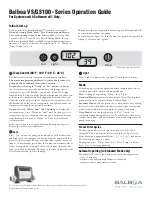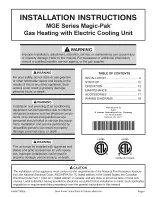
Reznor, RHC21 4000 Installation EN May 2021 D301334 Issue 0 Page No 21 of 56
If the reset button requires
activating for any reason, the
cause must be determined. After
determining and correcting the
problem, restart the heater and
monitor for a period long enough
to ensure proper operation
(approximately 5 minutes).
Ensure that all cables and installers wiring are
appropriately fixed and that they do not touch
the flue or combustion collector box.
To ensure that the unit is airtight, all unused
cable couplings must be hermetically sealed.
Permanent damage can occur
to the ignition controller when
faulty/incorrect connections to the
thermostat, reset switch or burner
failure lamp are made!
Switching of wires for reset switch
and flame failure will destroy the
ignition controller.
4.12 Electrical isolator
Ensure that an electrical Isolator with two pole
separation with a minimum air break between
poles of 3.0 mm has been fitted adjacent to the
air heater.
4.13 Room space / duct sensor siting
Each module requires a 0-10V DC control
signal in order to operate. A room space / duct
thermostat / sensor should be used to ensure
the correct room space / duct temperature is
achieved.
The siting of the room thermostat
(if used) is important. Do not fit on
an outside wall. Avoid location in
draughty areas or where it may be
influenced by heat sources e.g. the
sun, etc.
Do not attempt to control more than one heater
module from a room thermostat or control
panel unless the control system is designed to
do so. Follow instructions supplied with such
panels.
Thermostat(s) and/or temperature sensor(s)
should be mounted on a vibration free
surface. Room thermostat(s) / sensor(s) should
be mounted about 1.5m above floor level.
Follow the thermostat manufacturers fitting
instructions.
It is essential the main input line and neutral to
terminals L and N remains live at all times even
when the appliance is switched off; this is to
ensure correct operation of the unit.
4.14 Wiring Diagrams
A unique wiring diagram has been separately
provided for the heater.
4.15 Condensate Collection and
Disposal
The RHC21 4000 has an integral 22mm
condensate discharge pipe, which the installer
should connect to the nearest foul drainage
point as part of a condensate disposal system.
A trap must be fitted inline before connecting to
a drain point.
A condensate disposal system that relies
on gravity should be satisfactory for most
installations. If a gravity system is not possible, a
condensate pump must be installed. There are a
number of commercially available pumps made
for this purpose. If using a condensate pump,
follow the pump manufacturer’s installation
recommendations.
The condensate water coming from the heater
has a pH-level of approx 4.6 and can affect
materials made from zinc and/or copper,
hence it is strongly advised against letting the
condensation water flow off through the gutter
without a condense neutralizing kit (by others)
being fitted.
A condensate discharge extension kit is available
for those instances when the discharge pipe
needs to be located outside the air handling
unit.
Ensure correct disposal of
condensate is carried out in
accordance with local and national
legislation/regulatory requirements.
















































